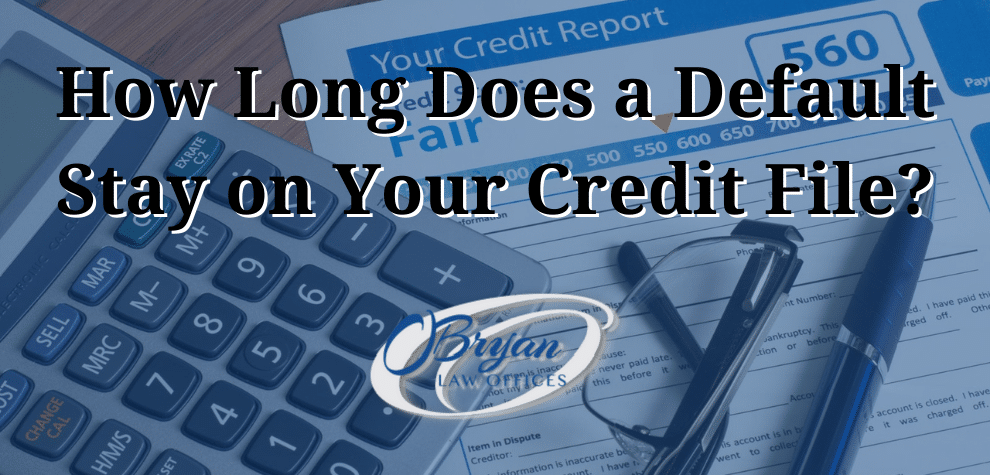A default might leave a stain on your credit record, making it difficult to get credit in the future. While you wait for the default to clear, you still have time to enhance your credit profile. You may lessen the bad impact of your default and improve how lenders view you by acting quickly and wisely, and it’s worth remembering that the impact of a default decreases over time. When clients approach us with questions, one of the most common is, “How long does a default stay on your credit file?” Below, we cover all this and more.
At O’Bryan Law Offices, we know that finances and credit scores are often confusing. Many people simply don’t have the same training or experience that a legal professional in the bankruptcy world has. For that reason, we prioritize not only advocacy on behalf of our clients, but also education. As best we can, we aim to ensure that our clients understand every step of the process while helping them get back on track. If you’re looking for a skilled Louisville bankruptcy attorney, call O’Bryan Law Offices today at 502-339-0222 or fill out our online intake form.
What Is a Default?
If your lender decides to cancel your account because you’ve missed payments, you’ve defaulted. This may happen to a bank account, a cell phone account, or a utility account such as electricity or water.
A default can happen no matter how much money you owe, whether it’s a few dollars or a few thousand dollars. It generally happens after three to six months of missed payments, however the length of time varies based on the lender’s stipulations. As a result, it’s critical to keep track of when someone will charge you and put money away for it.
What Is a Default Notice?
A default notice is a letter from a lender informing you that you have fallen behind on your payments. It also states that they will cancel your account unless you pay up. It’s your last chance to prevent a default. To avoid a default, you should strive to pay the amount you owe as soon as possible. When you skip payments, it is not a requirement that lenders send you a default notice. However, many people view this as a good practice. For more in-depth information, we recommend reading up on Kentucky’s laws and statutes about defaults.
How Long Do Defaults Last?
The short answer is a little complex. Items might stay on your report for a few years or a lifetime, depending on what they are. Most things submitted to credit bureaus, however, fade away between two and 10 years after the bureaus initially recorded them. Specifically, they remove defaults from your credit report seven years after the date you missed your first payment.
Don’t worry, there’s some good news. As these bad elements age, they will have less weight in credit scoring systems. In other words, if you start implementing positive credit practices, such as making on-time loan payments and maintaining modest debt levels, your credit score will not bear the brunt of a mistake for the whole time an item is on your credit reports.
How Long Does a Default Stay on Your Credit File?
Whether you pay off the obligation or not, a default will remain on your credit history for seven years from the date of default. The good news is that the lender cannot re-register your default once they erase it. This holds true even if you still owe them money. However, you should continue to make any outstanding payments since the lender may file a CCJ against you.
It’s important to keep in mind that your lender may sell your debt to a debt collector. Debt collectors specialize in the repayment of debts. However, the lender must indicate this on your credit record so that it does not appear that you have two defaults. Furthermore, the amount and date should not alter, so you won’t have to pay more or wait longer to get your default deleted.
Additional reading: when is it too late to stop foreclosure
Does Your Credit Score Go Up When a Default Is Removed?
When a default initially appears on your credit report, you should expect a significant reduction in your credit ratings. That’s because the more current bad information you have, the more it will affect your results. Missed payments and other events leading up to the default will also affect your credit score.
The impact of a default on your score will diminish over time. The default, like all bad information, will gradually fade from your credit report over time, at which point you may see a modest rise in your credit scores.
From the month you stopped making payments on the loan, the default will appear on your credit reports and be included into your scores for seven years. Meanwhile, good credit practices might help you restore your credit and get back on track after a default.
Is It True That After 7 Years Your Credit Is Clear?
After seven years from the date of your first missed payment, the majority of bad things will automatically disappear from your credit record. If you’re unfamiliar with your credit report, it’s a document that shows all of your credit and loan accounts as well as payment history with major banks and other financial organizations.
After seven years, the debt itself does not go away, especially if you haven’t paid it. Even if the debt is too old to appear on your credit record, you owe it to your creditor. Creditors, lenders, and debt collectors can still utilize the correct legal procedures to recover the debt from you since the debt still exists. If the court has given authority, this includes contacting you, sending letters, and garnishing your earnings. If your state’s statute of limitations on debt is longer than seven years, you can be sued for it.
What Happens Seven Years After a Default?
Many consumers are frightened about restarting the credit reporting time limit if they settle a past due debt. The clock starts ticking the first time you miss a payment, and the good news is that the seven-year term for negative information does not reset if you bring your account current or pay off the debt.
Check your credit report to see when bad entries on your credit record are due to be removed. When the seven-year period is over, the credit bureaus should remove any outdated information without your intervention.
If you have a bad record on your credit report that is older than seven years, you can dispute it with the credit agency and have it removed from your credit report.
Contact O’Bryan Law Offices Today
At O’Bryan Law Offices, we handle all manner of bankruptcy cases at our Louisville bankruptcy office. From Chapter 13 bankruptcy cases to Chapter 7 bankruptcy cases, we handle it all. Our number one priority is helping our clients get back on their feet after tough times. For more information about the services we offer, or to schedule a consultation, please call 502-339-0222 today.








